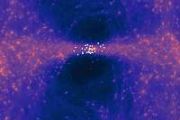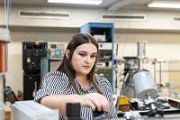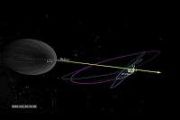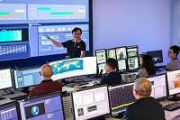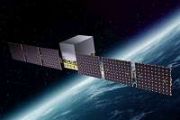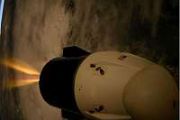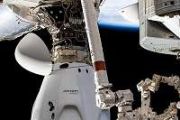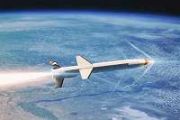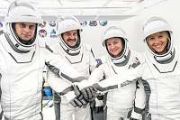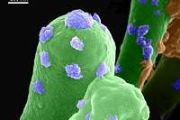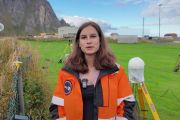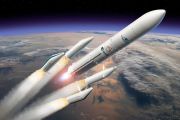
Copernical Team
Perovskite betavoltaic cell sets record efficiency using carbon 14 source
 A research team at DGIST has developed a perovskite based self powered betavoltaic battery that achieves what they report as the worlds highest conversion efficiency for this class of device while maintaining long term operational stability. The work targets applications that require continuous reliable power without external charging, such as artificial intelligence systems, internet of things
A research team at DGIST has developed a perovskite based self powered betavoltaic battery that achieves what they report as the worlds highest conversion efficiency for this class of device while maintaining long term operational stability. The work targets applications that require continuous reliable power without external charging, such as artificial intelligence systems, internet of things 2025 was third hottest year on record: EU, US experts
 The planet logged its third hottest year on record in 2025, extending a run of unprecedented heat, with no relief expected in 2026, US researchers and EU climate monitors said Wednesday.
The last 11 years have now been the warmest ever recorded, with 2024 topping the podium and 2023 in second place, according to the EU's Copernicus Climate Change Service and Berkeley Earth, a California-base
The planet logged its third hottest year on record in 2025, extending a run of unprecedented heat, with no relief expected in 2026, US researchers and EU climate monitors said Wednesday.
The last 11 years have now been the warmest ever recorded, with 2024 topping the podium and 2023 in second place, according to the EU's Copernicus Climate Change Service and Berkeley Earth, a California-base Energy learning algorithm boosts complex UAV swarm tasking
 With unmanned aerial vehicles now common across modern military and security operations, planners face increasing pressure to assign heterogeneous drone swarms to complex mission sets without wasting time or resources. A new study in the journal Defence Technology reports an energy learning hyper-heuristic algorithm that tackles cooperative task assignment under multiple operational constraints.
With unmanned aerial vehicles now common across modern military and security operations, planners face increasing pressure to assign heterogeneous drone swarms to complex mission sets without wasting time or resources. A new study in the journal Defence Technology reports an energy learning hyper-heuristic algorithm that tackles cooperative task assignment under multiple operational constraints. Keysight joins Airbus UpNext SpaceRAN project to advance 5G satellite NTN
 Keysight Technologies is collaborating on the Airbus UpNext SpaceRAN demonstrator to explore 5G non-terrestrial network capabilities using software-defined satellite technology in both ground and in-orbit scenarios. The initiative focuses on using a Low Earth Orbit satellite platform to test how next generation satellite payloads can support emerging 5G services from space.
The project add
Keysight Technologies is collaborating on the Airbus UpNext SpaceRAN demonstrator to explore 5G non-terrestrial network capabilities using software-defined satellite technology in both ground and in-orbit scenarios. The initiative focuses on using a Low Earth Orbit satellite platform to test how next generation satellite payloads can support emerging 5G services from space.
The project add Teledyne detector arrays power NASAs BlackCAT CubeSat X-ray mission
Sentinel 2A trials reveal unexpected night sensing capability
 After more than 10 years in orbit, the first Copernicus Sentinel 2 satellite, Sentinel 2A, is still finding new ways to contribute to Earth observation as engineers push the mission beyond its original remit.
With Sentinel 2B and Sentinel 2C now leading the core task of delivering high resolution, camera like images of Earths surface, Sentinel 2A is being used as a test platform to explore
After more than 10 years in orbit, the first Copernicus Sentinel 2 satellite, Sentinel 2A, is still finding new ways to contribute to Earth observation as engineers push the mission beyond its original remit.
With Sentinel 2B and Sentinel 2C now leading the core task of delivering high resolution, camera like images of Earths surface, Sentinel 2A is being used as a test platform to explore NASA astronaut stuck in space for nine months retires
 A NASA astronaut who was stuck in space for nine months because of problems with her spacecraft has retired after 27 years of service, the space agency said Tuesday.
Suni Williams stepped down from her post on December 27 - making her ill-fated mission her last journey to space.
Williams and fellow astronaut Barry "Butch" Wilmore set out on an eight-day mission in June 2024 to test fly
A NASA astronaut who was stuck in space for nine months because of problems with her spacecraft has retired after 27 years of service, the space agency said Tuesday.
Suni Williams stepped down from her post on December 27 - making her ill-fated mission her last journey to space.
Williams and fellow astronaut Barry "Butch" Wilmore set out on an eight-day mission in June 2024 to test fly Comtech wins multi-million dollar follow-on contract for civil space components
 Comtech Telecommunications Corp. has received a follow-on space components award valued at more than 5 million dollars to support a major civil space exploration program in the United States. The award underlines the companys role as a global communications technology supplier to both commercial and government space customers.
Under the contract, Comtech will deliver advanced electronic co
Comtech Telecommunications Corp. has received a follow-on space components award valued at more than 5 million dollars to support a major civil space exploration program in the United States. The award underlines the companys role as a global communications technology supplier to both commercial and government space customers.
Under the contract, Comtech will deliver advanced electronic co Slingshot to embed AI agent in US Space Force space warfare training
 Slingshot Aerospace has secured a 27 million dollar contract to modernize how the US Space Force trains for conflict in orbit by embedding its TALOS AI agent into the service's Operational Test and Training Infrastructure program. The 18 month effort will integrate AI native technology into existing training capabilities so that exercises more accurately reflect the rapidly evolving orbital thre
Slingshot Aerospace has secured a 27 million dollar contract to modernize how the US Space Force trains for conflict in orbit by embedding its TALOS AI agent into the service's Operational Test and Training Infrastructure program. The 18 month effort will integrate AI native technology into existing training capabilities so that exercises more accurately reflect the rapidly evolving orbital thre AST SpaceMobile secures role on MDA SHIELD defense architecture
 AST SpaceMobile has been selected for a prime contract position on the U.S. Missile Defense Agency Scalable Homeland Innovative Enterprise Layered Defense, or SHIELD, program, placing its space-based cellular broadband architecture inside a key U.S. missile defense modernization effort. The indefinite-delivery, indefinite-quantity framework is designed to rapidly deliver new capabilities across
AST SpaceMobile has been selected for a prime contract position on the U.S. Missile Defense Agency Scalable Homeland Innovative Enterprise Layered Defense, or SHIELD, program, placing its space-based cellular broadband architecture inside a key U.S. missile defense modernization effort. The indefinite-delivery, indefinite-quantity framework is designed to rapidly deliver new capabilities across 

